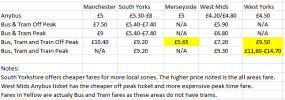If this is what he wanted so badly, why not simply buy System One rather than forcing franchising?
For the fares, I think it's worth noting the fact that TFGM demands make the fares higher than they need to be. I made a spreadsheet recently. In almost all instances, Manchester is much higher priced and that will be due to TFGM. This was made for a comparison against PTE areas admittedly so doesn't include Blackpool or Nottingham who also have bus and tram tickets but I will add them below in text.
Nottingham Bus and tram, £5.70
Blackpool Bus and Tram, £6.60
View attachment 126039
[Image shows a comparison of multi modal and multi operator tickets offered in Manchester, South Yorkshire, Merseyside, West Midlands and West Yorkshire]
Acceptance is voluntary but the vast majority of operators accept it. I can't think of anyone who does normal local bus services who doesn't accept it. Train operators I think all participate too, even where the journey options are limited like Avanti and Cross Country, the only journeys which can be made on the ticket is Stockport to Piccadilly.
As for forcing operators into the scheme, they could put it into tender requirements to accept the ticket if they so wished.
Also ignoring the fact that bus operators within London, under a franchising model, actually make significantly better profits because they can bid more daft prices. Stagecoach put in one of their annual reports that the London profits covered the losses of the rest of the divisions through Covid.
Presumably because it's the best way of doing things. This whole thing was nothing more than Burnham wanting control over everyones lives and pandering to huge lobbyists such as WeOwnIt. He knows damn well that the bus network is better now than it will be in public hands. TFGM can't even sort school tenders in a timely manor now. They've no hope of sorting a proper bus network. As with the tendered buses though, it will simply be a case of those who shout loudest get the buses and those who have a life and contribute to society via taxes, those who have no time to be petitioning for buses because they have to attend work, will be pushed aside so that freeloading grannys can get a door to door bus. After all, that is what the tendered buses in Manchester area. All of the TFGM cuts which keep happening are met with backlash by some councillors (who conveniently blame big bad bus operators for TFGMs spending cuts. How that works is anyones guess) and the same few councillors get their way time and time again. David Mellor from Stockport is one such councillor.
All that wasteful competition which most of the time is actually a collection of routes ran by different operators serving different markets. Manchester - Walkden for example. Diamond and Stagecoach branch off into different places. If this 'wasteful competition' was reduced, is that not an easy way of saying frequencies will be reduced. Lower frequencies clearly make buses less attractive and so less people choose to travel.
Similarly Manchester - Middleton. Each firm does things differently. First and Stagecoach go way off through their own kind of exclusive areas. Diamond and GoAhead do run up Rochdale Road but beyond that, they branch off into their own areas. Again, a reduction would mean cutting frequencies. I notice how that was never mentioned. How can you keep the high frequencies which people like while reducing competition between routes. You can add to that the fact that the competition means lower fares in these areas, under franchising, the fares in these areas will jump quite high.
That was all just side reasons. Main one is Burnham wants control. Very much like the SNP with independence, Burnham thinks that a vote for him is a vote for bus franchising. He will do absolutely anything to have control. Doesn't matter if nothing changes, it costs a fortune and people hate it in the end, the fact that he has the power to control a bit of peoples lives, he thrives off it. He sees the dictatorship and communist governments elsewhere and that is his vision for Manchester basically.
Most of the things which he has promised to do with franchising, Conservative West Midlands has done better with their partnership scheme or other PTEs have done it better using existing resources. Burnham won't admit any of that though because it invalidates all of the cases he makes for franchising. His lie count it about on par with the conservatives through Covid and that is saying something but he has zero accountability so it doesn't matter what he says, people believe it.
If franchising really was the best way forwards, why was the consultation so heavily biased? The only reason for a biased consultation is to push through what you want to while blinding the public to the realities. If franchising is the best way to go, why didn't West Midlands go for it? Conservative ran, they would have got the funding for that easily. If franchising was the best way to go, why has nothing changed in the first place and why were no proper plans put forward to people to show the difference franchising can make rather than just constant bullet pointing which, in my opinion, shows quite clearly that they have no clue how they will act on any of their promises. TFGM staff are already worried about how they will deliver on the things Burnham is promising and that is without route specific proposals. The scheme will be a failure but no one will admit it as Burnahm is treated like some sort of god.
 www.facebook.com
www.facebook.com
 www.facebook.com
www.facebook.com


